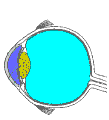 |
Monkeys Shed Light on the Nightlight Controversy |  |
| (Monkey study suggests that nightlights do NOT cause eye problems) |
 |
Monkeys Shed Light on the Nightlight Controversy |  |
| (Monkey study suggests that nightlights do NOT cause eye problems) |
June 3, 2001
The Controversy In 1999, research suggested
that children who used nightlights were at a greater risk of becoming
nearsighted than those who did not use nightlights. However, in 2000, research indicated that nightlights did NOT
contribute to nearsightedness and instead suggested that nearsightedness
may be inherited from parents. A recent study published in the May 2001
issue of Investigative Ophthalmology and Visual Science provides
additional evidence that exposure to lights does NOT cause nightsightedness.
In 1999, research suggested
that children who used nightlights were at a greater risk of becoming
nearsighted than those who did not use nightlights. However, in 2000, research indicated that nightlights did NOT
contribute to nearsightedness and instead suggested that nearsightedness
may be inherited from parents. A recent study published in the May 2001
issue of Investigative Ophthalmology and Visual Science provides
additional evidence that exposure to lights does NOT cause nightsightedness.
Monkeys and Eye GrowthNearsightedness, also called myopia, occurs when an image is focused in front of the retina. A common cause of myopia is a long eyeball. Researchers at the University of Houston and Emory University studied whether the eyes of monkeys that were exposed to continuous light were different than those in monkeys raised under normal light conditions.
The researchers studied rhesus monkeys between the ages of 1 and 4 weeks old. Nine monkeys (experimental group) were raised in rooms where fluorescent ceiling lights were kept on for 24 hours each day for at least 6 months. Another 23 rhesus monkeys (control group) were raised in rooms where the lights cycled on for 12 hours and then off for 12 hours. After 6 months, the researchers examined the eyes of the monkeys. However, they were unable to find differences between the two groups:
Although this new study suggests that early exposure to light does not affect the eye, questions still remain:
|
| Reference:
|
 Do You Wear Glasses? |
 The Eye |
 The retina |
 Experiments and Activities about Vision |
| BACK TO: | Neuroscience In The News | Table of Contents |
![[email]](./gif/menue.gif) Send E-mail |
 Fill out survey |
 Get Newsletter |
 Search Pages |
 Take Notes |